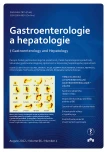Successful treatment of a patient with obstructed defecation syndrome
Authors:
M. Stefanová 1; J. Martínek 1; M. Dudek 2; J. Frydrych 3; M. Zavoral 1
Authors‘ workplace:
Interní klinika 1. LF UK a ÚVN Praha
1; Chirurgické oddělení Nemocnice Jablonec nad Nisou
2; Radiodiagnostické oddělení Nemocnice Jablonec nad Nisou
3
Published in:
Gastroent Hepatol 2012; 66(4): 273-275
Category:
Clinical and Experimental Gastroenterology: Case Report
Overview
Obstructed defecation syndrome is a relatively common cause of constipation and most frequently occurs in elderly women. This syndrome is caused by various anatomical changes including rectocele, enterocele and intrarectal intussusception which block spontaneous defecation. The case report describes the diagnosis of obstructed defecation syndrome using dynamic defecography and also a successful combination of surgery and physiotherapy.
Key words:
constipation – obstructed defecation syndrome – defecography
The authors declare they have no potential conflicts of interest concerning drugs, products, or services used in the study.
The Editorial Board declares that the manuscript met the ICMJE „uniform requirements“ for biomedical papers.
Submitted:
28. 6. 2012
Accepted:
8. 8. 2012
Sources
1. Varma MG, Hart SL, Brown JS et al. Obstructive defecation in middle aged women. Dig Dis Sci 2008; 53(10): 2702–2709.
2. Manning J, Korda A, Benness C et al. The association of obstructive defecation, lower urinary tract dysfunction and the benign joint hypermobility syndrome: a case-control study. Int Urogynecol J Pelvic Floor Dysfunct 2003; 14(2): 128–132.
3. Zhang B, Ding JH, Yin SH et al. Stapled transanal rectal resection for obstructed defecation syndrome associated with rectocele and rectal intussusceptionWorld J Gastroenterol 2010; 16(20): 2542–2548.
4. Papachrysostomou M, Smith AN. Effects of biofeedback on obstructive defecation – reconditioning of the defecation reflex? Gut 1994; 35(2): 252–256.
Labels
Paediatric gastroenterology Gastroenterology and hepatology SurgeryArticle was published in
Gastroenterology and Hepatology

2012 Issue 4
- Possibilities of Using Metamizole in the Treatment of Acute Primary Headaches
- Metamizole at a Glance and in Practice – Effective Non-Opioid Analgesic for All Ages
- Metamizole vs. Tramadol in Postoperative Analgesia
- Spasmolytic Effect of Metamizole
- The Importance of Limosilactobacillus reuteri in Administration to Diabetics with Gingivitis
-
All articles in this issue
-
Quality of life is an important factor in the balance sheet indicator in patients with pancreatic cancer
Multicenter prospective study - New section Discussion panel
- Chronic dyspepsia: what and how in common practice
- 44th congress of the European Pancreatic Club (EPC) and PROMED symposium in 2012
- Dulcolax® suppositories
- Marginal constipation
- Constipation and surviving myths. Laxatives
- Constipation and hypofunction of the thyroid glandMyth or reality?
- Solitary rectal ulcer syndrome
- Defecography
- The radiobuclide colon segmental transit assessment by 67Ga-citrate
- Successful treatment of a patient with obstructed defecation syndrome
- Mesenterial fibromatosis as the cause of an acute abdominal condition
- Standard diagnostic and therapeutic process of IBD-associated anaemia
-
Long-term Infliximab Maintenance Therapy for Ulcerative Colitis
The ACT-1 and ACT-2 Extension Studies - Flexible esophagogastroscopy – which findings can be seen by a gastroenterologist in the hypopharynx and larynx?
- Endoscopic polypectomy – how to achieve quality standards in 2012?
- Treatment of spontaneous bacterial peritonitis
-
Quality of life is an important factor in the balance sheet indicator in patients with pancreatic cancer
- Gastroenterology and Hepatology
- Journal archive
- Current issue
- About the journal
Most read in this issue
- Defecography
- Constipation and hypofunction of the thyroid glandMyth or reality?
- Solitary rectal ulcer syndrome
- Treatment of spontaneous bacterial peritonitis
